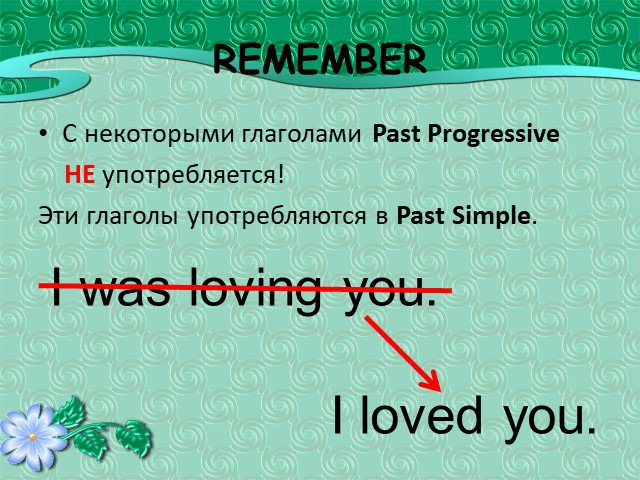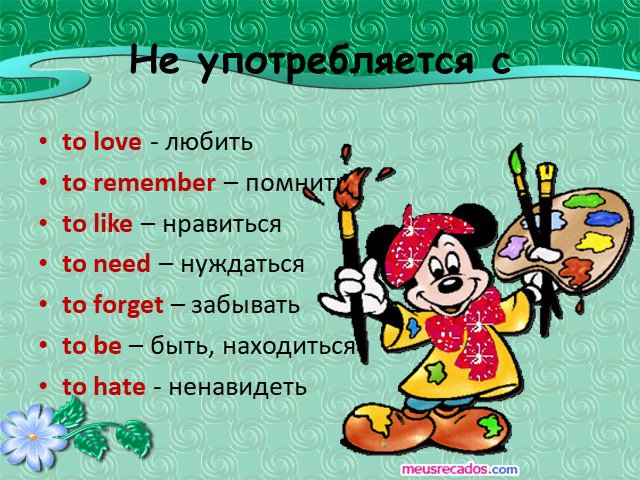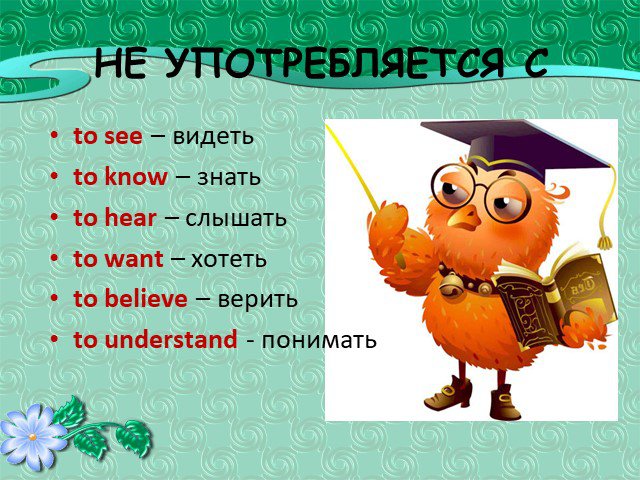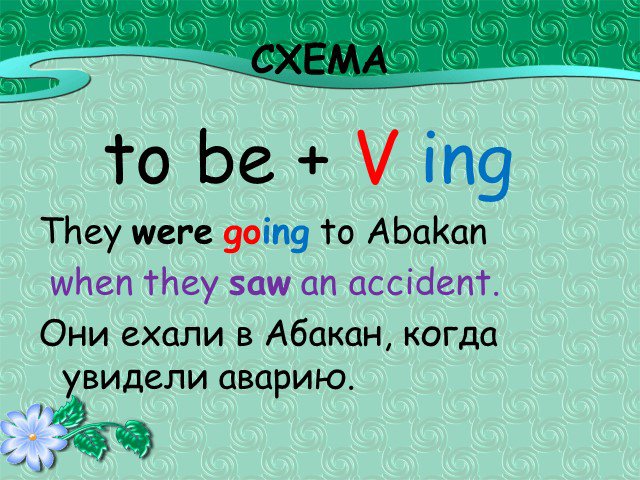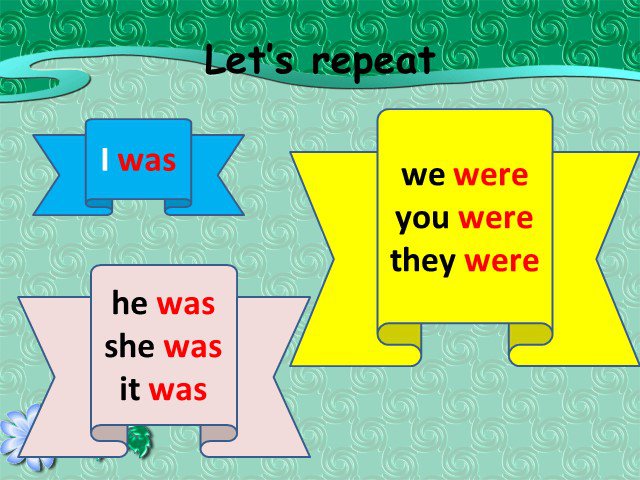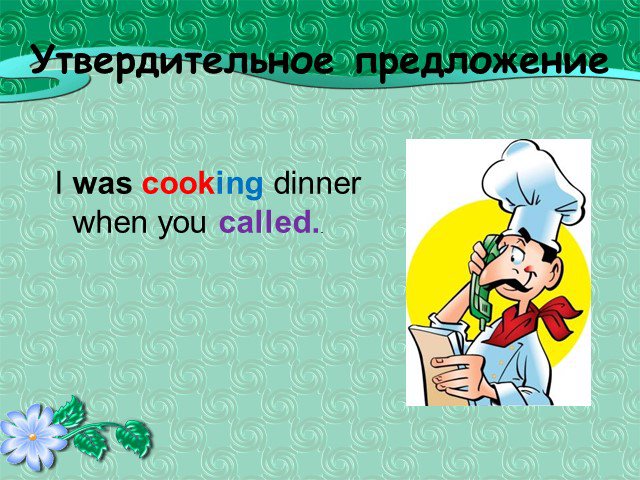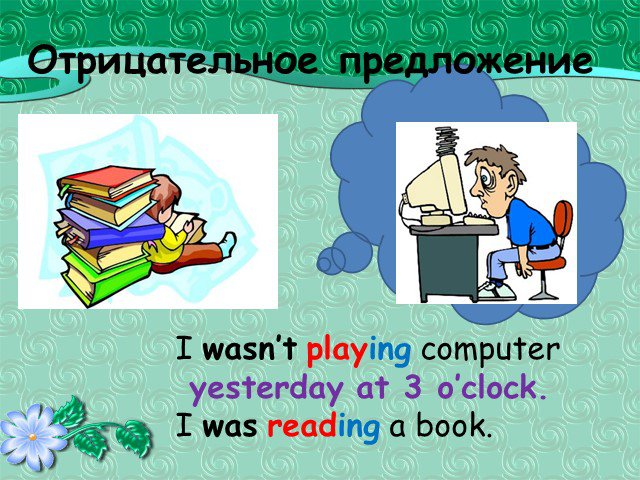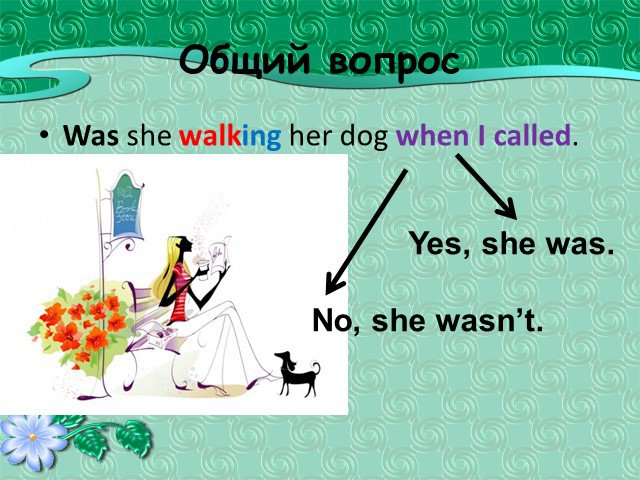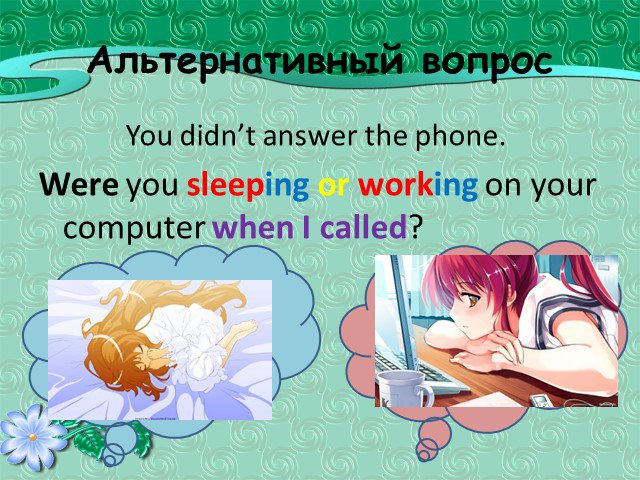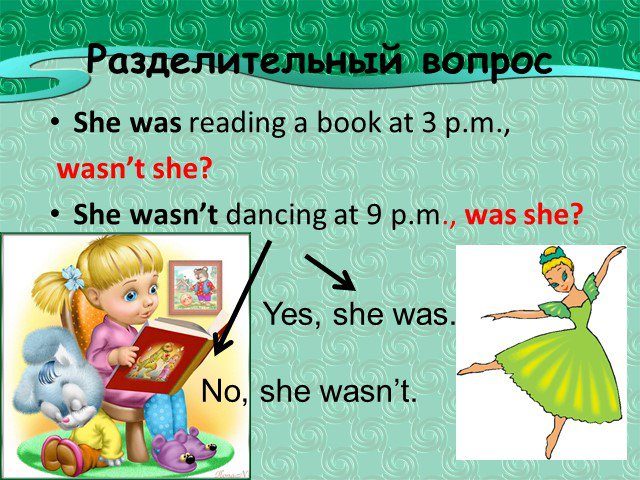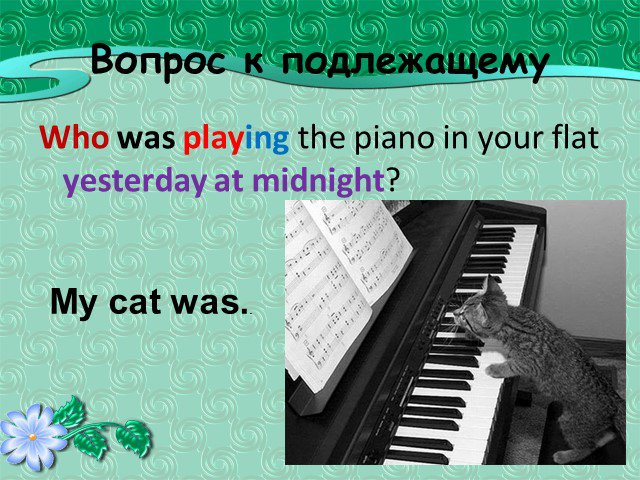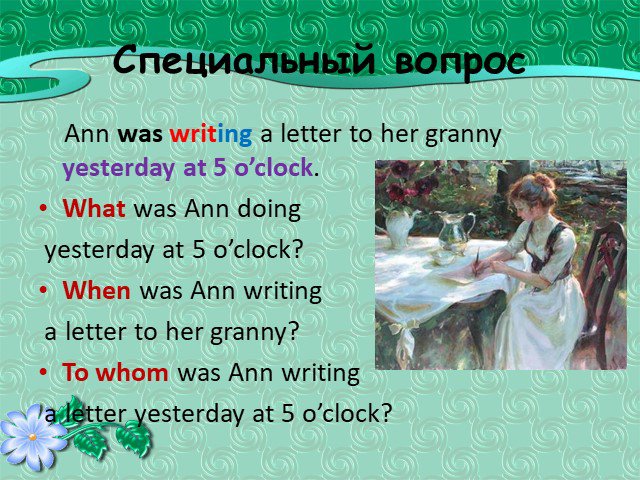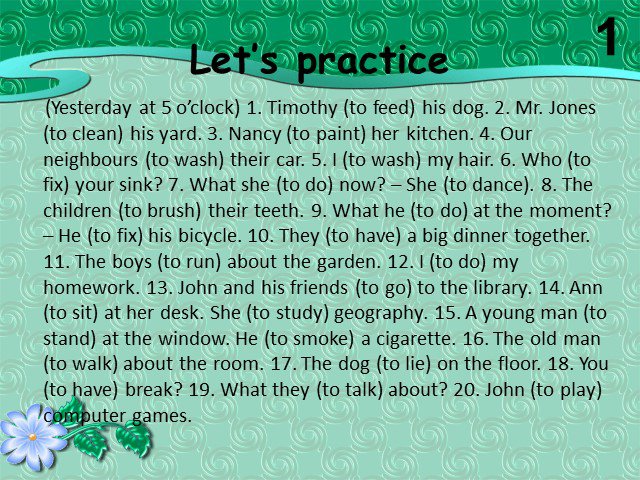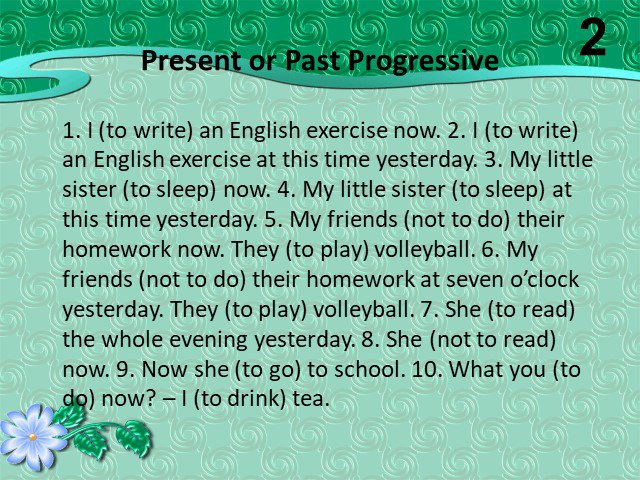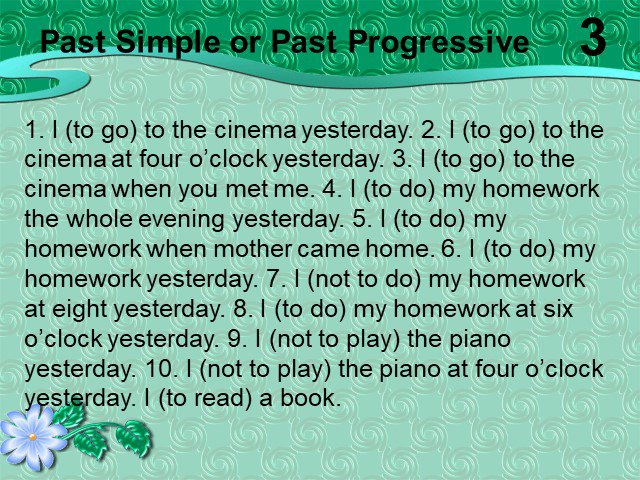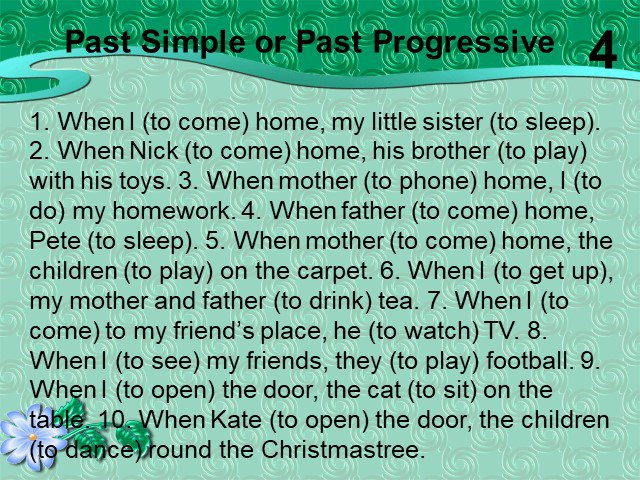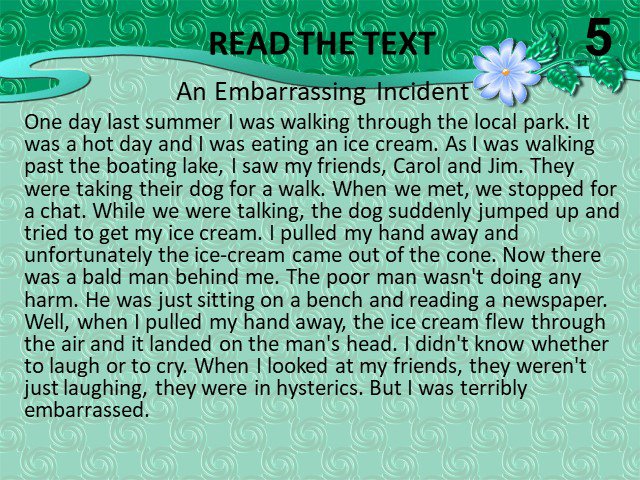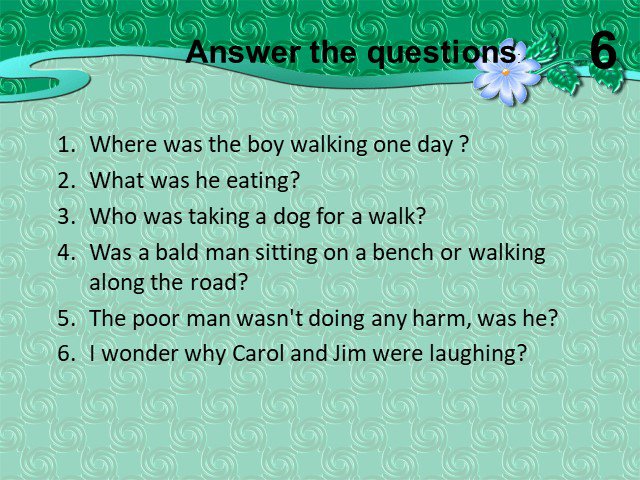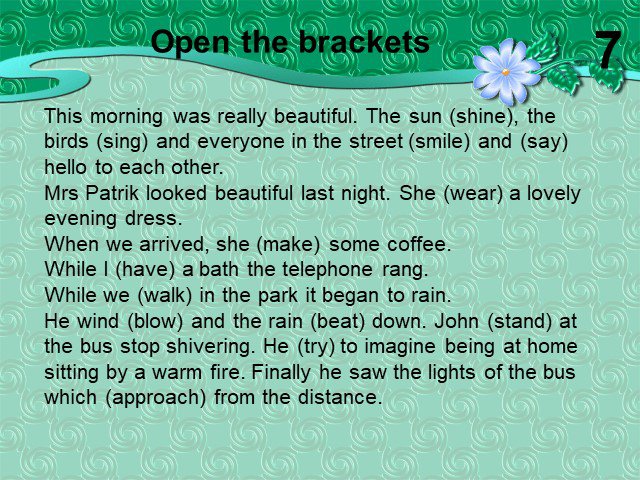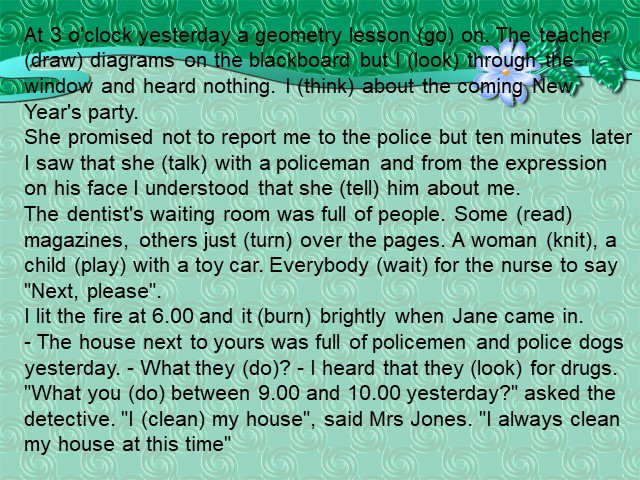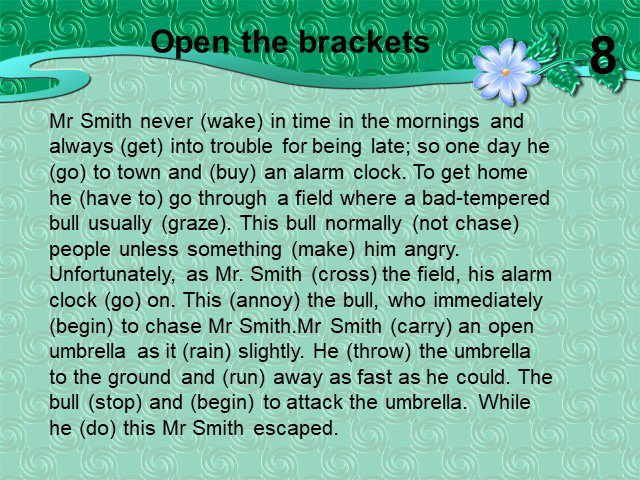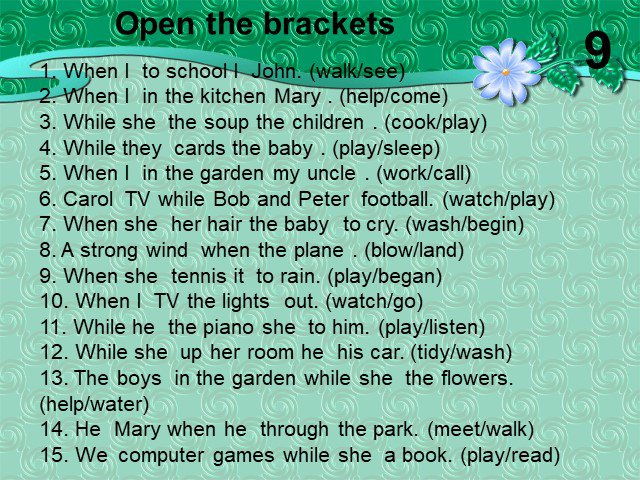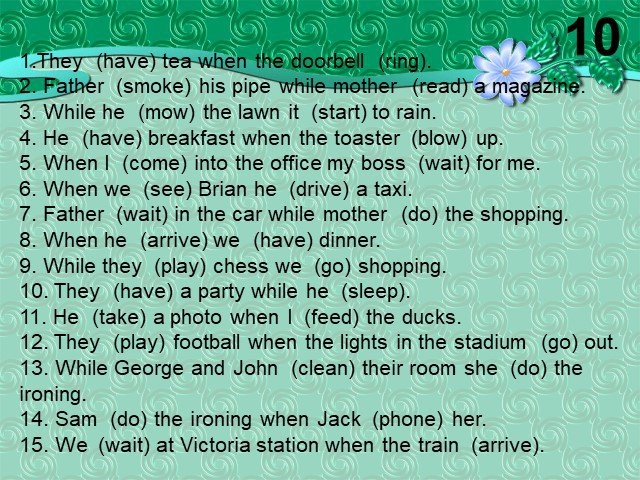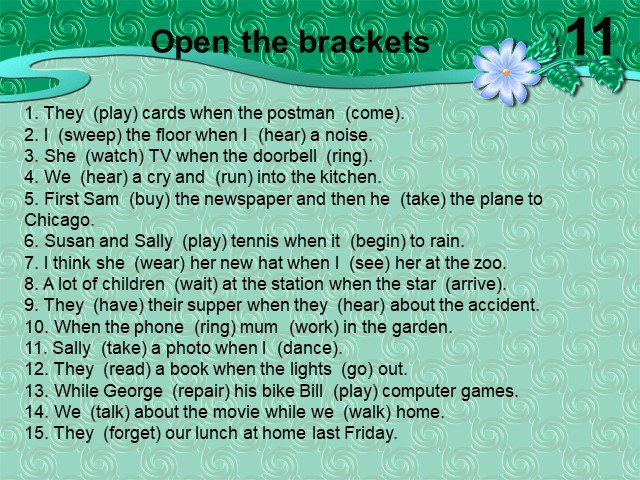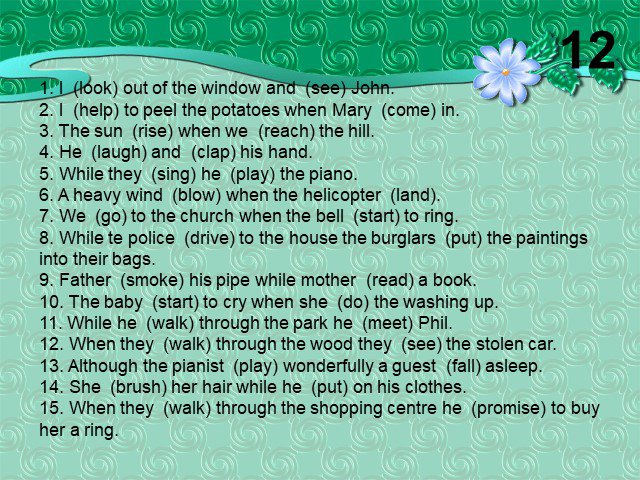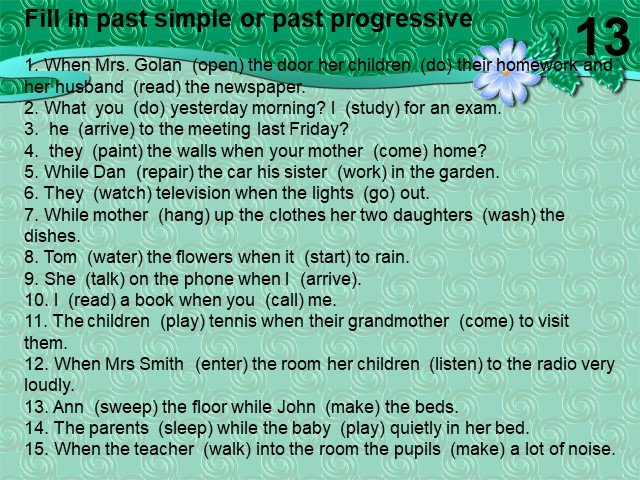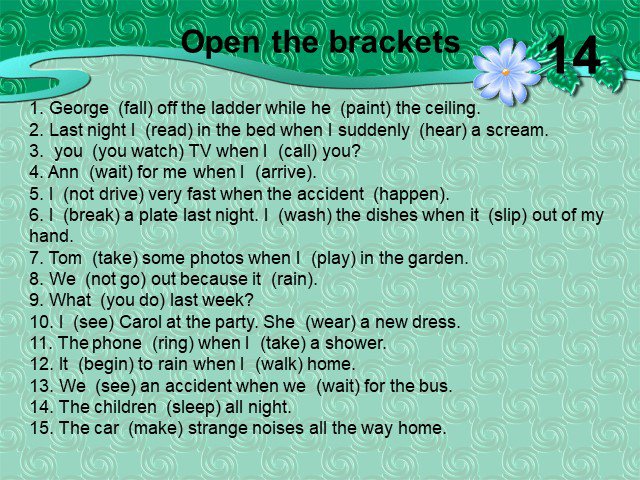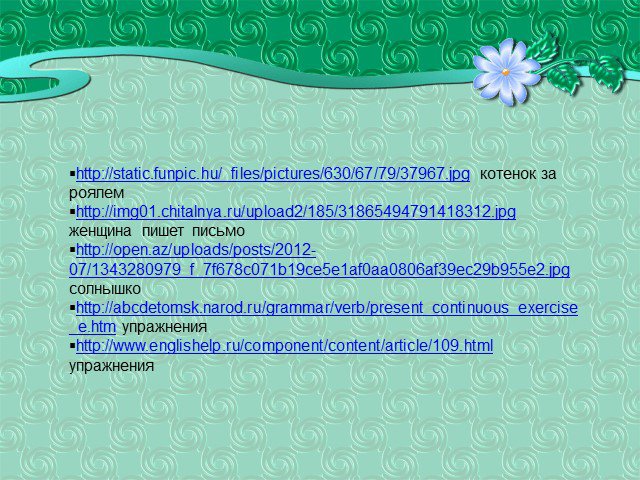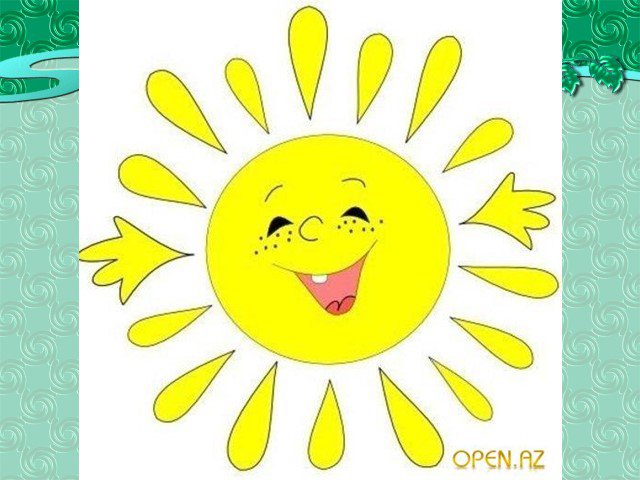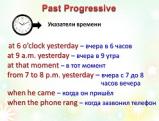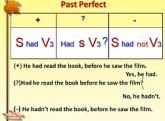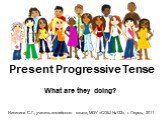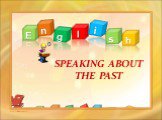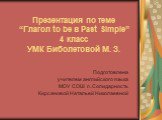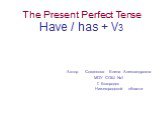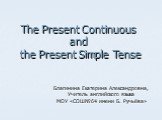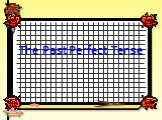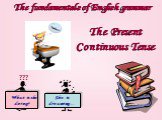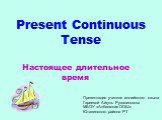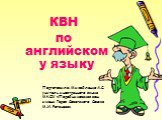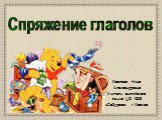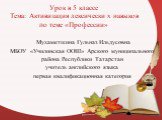Презентация "Past progressive tense" по английскому языку – проект, доклад
Презентацию на тему "Past progressive tense" можно скачать абсолютно бесплатно на нашем сайте. Предмет проекта: Английский язык. Красочные слайды и иллюстрации помогут вам заинтересовать своих одноклассников или аудиторию. Для просмотра содержимого воспользуйтесь плеером, или если вы хотите скачать доклад - нажмите на соответствующий текст под плеером. Презентация содержит 34 слайд(ов).
Слайды презентации
Список похожих презентаций
The present progressive tense
The Present Simple Tense Настоящее Простое время. Обозначает регулярное действие V/V-s (he, she, it) every day – каждый день. Make up the sentences ...Past progressive (прошедшее длительное время)
пятница, 22 декабря 2017 г. PRESENT PROGRESSIVE Ving be am is are. be - was/were was were PAST PROGRESSIVE. What was he doing yesterday at …? not. ...Present progressive tense. what are they doing?
I am calling my friends At half past three. They are very busy, They can't come to me: Pete is reading a book, Kate is learning to cook, Pat is feeding ...Past simple tense
Remember! Простое прошедшее время (Past Simple Tense) обозначает действия, которые произошли в прошлом. Remember ! Правильно говорить о том, что действие ...Past progressive
Употребление. Для выражения действий, которые происходили в точно указанный момент времени в прошлом. Момент времени может быть выражен: Точным указанием ...Past, present, future (настоящее, прошедшее, будущее время)
Определите время в предложении. 1. I go to bed at ten every day. 2. I didn’t go to the country last summer. 3. Will you watch TV tomorrow? 4. She ...Speaking about the past (поговорим о прошедшем времени)
Данилочкина Елена Сергеевна МОУ гимназия №36 г. Иваново Учитель английского языка. WHAT DID THE CHILDREN DO AT DICK’S BIRTHDAY PARTY ? One day Nick ...Past continuous
Что это? Я зашел в дом. Я шел домой (в 7 часов) I was going home (at 7). Когда употребляем. Вчера в 6 часов (yesterday at 6 o’clock) На прошлой неделе ...Глагол to be в past simple
Compare. Present Simple 1. I am at home now. 2. Fred is happy now. 3. My friends are schoolgirls. Past Simple I was at home yesterday. 2. Fred was ...The present simple tense (настоящее простое время)
The Present Simple Tense. Вопросительные и отрицательные предложения. Как-то раз глаголы-пешки собрались, и все вместе отправились на поклон к королю ...The present perfect tense
What does Present Perfect mean? Present Perfect, настоящее совершенное время, выражает связь прошлого с настоящим. Эта связь может выражаться двояко: ...The present continuous and the present simple tense (настоящее длительное и простое время)
Большинство глаголов употребляются и в Present Continuous, и в Present Simple. Listen! She is playing the piano. She plays the piano very well. Некоторые ...Past simple - прошедшее простое время
. Образование Past Simple. V + - V2 ed. Глагол to be в Past Simple. I You He/ she/ it Was We You They Were. Указатели времени в Past Simple. Yesterday- ...Past simple
Цели урока. социокультурный аспект — знакомство с достопримечательностями Англии: Alton Towers, Cadbury World, York, the Viking Centre; развивающий ...Past perfect passive
Past Perfect Passive Образуется при помощи глагола had (not в отрицаниях) + been+причастие прошедшего времени (окончание -ed для правильных глаголов, ...Past perfect
Глагол в форме Past Perfect выражает действие, которое завершилось до определенного момента или другого действия в прошлом. They had finished the ...The present continuous tense
The Present Continuous Tense (Настоящее длительное время). употребляется для обозначения действия, происходящего в данный момент, в момент речи или ...Present continuous tense
Когда мы употребляем Present Continuous Tense. Present continuous обозначает длительное действие, которое совершается в настоящее время, в момент ...Конспекты
PAST TENSES ACTIVE
PAST. . TENSES. . ACTIVE. / ПРОШЕДШИЕ ВРЕМЕНА АКТИВНОГО ЗАЛОГА. PAST. . SIMPLE. ПРОШЕДШЕЕ ПРОСТОЕ. (констатация факта в прошлом). PAST. . ...Путешествие в королевство Past Simple Tense
МАОУ СОШ № 17 города Липецка. Урок английского языка. . в 4-ом классе. по теме:. . «Путешествие в королевство Past. Simple. ...Past Progressive
МБОУ Лицей № 7. г. Саяногорска Республика Хакасия. . . Конспект урока по английскому языку:. «. Past Progressive. ». . . . ...The Past Simple Tense
Конспект урока для 6 класса «. The. . Past. . Simple. . Tense. ». Конспект предназначен для проведения урока с учащимися 6 класса средней общеобразовательной ...Past SimpleTense
Самоанализ урока английского языка в 3 классе по теме “Past. Simple. Tense. ”. Учитель Егорина И.М. Данный урок является уроком-закреплением, ...Past Simple Tense
Урок английского языка для 5 класса. Урок английского языка в 5 классе. Учитель: Фадеева Елена Владиславовна. ЦЕЛИ УРОКА:. Актуализация грамматического ...THE PAST PERFECT TENSE
ПРОШЕДШЕЕ СОВЕРШЕННОЕ ВРЕМЯ (THE PAST PERFECT TENSE). 1. Утвердительная форма прошедшего совершенного времени образуется при помощи вспомогательного ...Past Simple Tense
Урок английского языка. Past. Simple. Tense. Автор: Тарасова Анна Александровна, учитель I. квалификационной категории ГБОУ г. Москвы СОШ №968. ...Present tense
Боташева Фатима Ханапиевна. МКОУ «СОШ №10 им. М. К. Магометова с. Красный Курган». Учитель английского языка. . . Test. . I variant. ...Present Simple Tense
Present Simple Tense. Вопросы для контроля. Что является показателем инфинитива глагола в английском языке? . . . Как переводится на русский ...Советы как сделать хороший доклад презентации или проекта
- Постарайтесь вовлечь аудиторию в рассказ, настройте взаимодействие с аудиторией с помощью наводящих вопросов, игровой части, не бойтесь пошутить и искренне улыбнуться (где это уместно).
- Старайтесь объяснять слайд своими словами, добавлять дополнительные интересные факты, не нужно просто читать информацию со слайдов, ее аудитория может прочитать и сама.
- Не нужно перегружать слайды Вашего проекта текстовыми блоками, больше иллюстраций и минимум текста позволят лучше донести информацию и привлечь внимание. На слайде должна быть только ключевая информация, остальное лучше рассказать слушателям устно.
- Текст должен быть хорошо читаемым, иначе аудитория не сможет увидеть подаваемую информацию, будет сильно отвлекаться от рассказа, пытаясь хоть что-то разобрать, или вовсе утратит весь интерес. Для этого нужно правильно подобрать шрифт, учитывая, где и как будет происходить трансляция презентации, а также правильно подобрать сочетание фона и текста.
- Важно провести репетицию Вашего доклада, продумать, как Вы поздороваетесь с аудиторией, что скажете первым, как закончите презентацию. Все приходит с опытом.
- Правильно подберите наряд, т.к. одежда докладчика также играет большую роль в восприятии его выступления.
- Старайтесь говорить уверенно, плавно и связно.
- Старайтесь получить удовольствие от выступления, тогда Вы сможете быть более непринужденным и будете меньше волноваться.
Информация о презентации
Дата добавления:15 января 2015
Категория:Английский язык
Содержит:34 слайд(ов)
Поделись с друзьями:
Скачать презентацию





